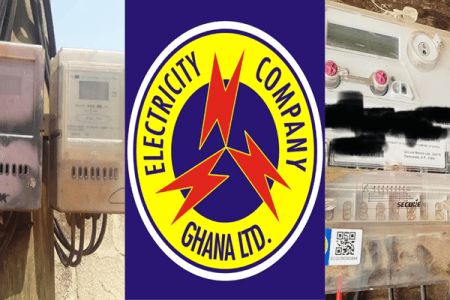The Public Utilities Regulatory Commission (PURC) has announced a fresh round of utility tariff increases, raising electricity prices by 14.75% and water tariffs by 4.02%.
The new rates, which affect all categories of consumers, will take effect from May 3, 2025.
According to a statement from the PURC, the adjustments are in line with its quarterly tariff review mechanism, which evaluates prevailing economic conditions and their impact on utility pricing.
352% steady increases in 16 years
This latest hike adds to a long-standing trend of rising electricity costs in Ghana.
Over the past 16 years, electricity tariffs have surged by over 352%, placing a growing financial burden on households and businesses across the country.
These increases have had a significant impact on the cost of living, while also making local manufacturing less competitive due to high operational expenses.
294.6% under NDC
From 2009 to 2016, during the President John Evans Atta Mills-John Mahama administration of the National Democratic Congress (NDC) government, electricity tariffs increased cumulatively by 294.6%.
The most dramatic spike occurred in 2010, when tariffs rose by 89%.
Subsequent years saw smaller but still substantial increases, with 10% in 2011, 7.42% in 2012, 58.9% in 2013, 28.35% in 2014, a staggering 90.93% in 2015, and 10% in 2016.
Despite the steep hikes, Ghanaians endured frequent and prolonged power outages popularly known as “dumsor” during 2013-2016—which affected productivity, daily life, and investor confidence.
57.45% under NPP
Under the administration of President Nana Akufo-Addo and Vice President Dr. Mahamudu Bawumia, electricity tariffs were increased more moderately, with a cumulative rise of approximately 57.45%.
In 2018, tariffs were reduced by 17.5%, followed by a 17.46% increase in 2019.
Notably, there were no tariff hikes in 2017, 2020, 2021, or 2022, offering consumers some relief.
However, this was followed by a sharp 51.02% increase in 2023, and another 6.47% in early 2024.
While the NPP government has ensured a more stable electricity supply than in NDC administration, intermittent outages still resurfaced in 2023 and 2024, rekindling fears of a return to dumsor.
Since the beginning of this year, intermittent outages continued.
PURC cites economic pressures and sector viability
In justifying the latest increases, the PURC cited several economic variables as key drivers: the depreciation of the Cedi against the U.S. dollar, prevailing inflation rates, the changing mix of electricity generation sources, and the rising cost of natural gas, which remains the primary fuel for power production.
The Commission explained that these adjustments are designed to maintain a balance—ensuring that utility companies do not either over-recover or under-recover their revenue.
It further indicated that the hikes could have been higher if it had aimed to fully recover deficits from previous quarters.
The review mechanism, it said, is based on transparent rate-setting guidelines to reflect changing economic conditions.
Utilities under financial pressure
The PURC also expressed concern about the deteriorating financial health of utility providers, warning that under-recovery of revenue was causing “serious bleeding” in the sector.
Without timely tariff adjustments, it cautioned, the long-term viability of power and water service providers would be at risk.
However, these explanations are unlikely to pacify a public already under pressure from rising prices and a challenging economic environment.
Consumer groups and business leaders are expected to push back against the increases, citing affordability concerns and inefficiencies in the utility sector.
Inefficiency, debt, and bad contracts
At the heart of the sector’s challenges lies the Electricity Company of Ghana (ECG), which has been criticized for chronic inefficiencies and massive financial losses.
The situation has been compounded by politically motivated contracts that have left the company vulnerable to unsustainable costs.
One of the most damaging practices has been the signing of “take-or-pay” agreements, which obligate ECG to pay independent power producers even for unused electricity.
Over the last eight years, ECG has paid over GH₵13 billion in capacity charges alone—essentially for power that was never consumed.
These contracts, often negotiated under political pressure, were signed in U.S. dollars.
As the Cedi depreciates, the cost of honouring these obligations escalates dramatically, further straining ECG’s finances. Moreover, many of the power plants involved in these contracts produce electricity at significantly higher costs than those in neighboring West African countries.
Procurement abuses and political interference
Beyond contracts, ECG’s financial troubles have been exacerbated by poor procurement practices.
Insiders claim that politicians and their associates have turned the company into a cash cow, forcing ECG to procure materials not needed at the time of procurement.
This has bloated costs and undermined the company’s ability to invest in essential infrastructure upgrades and customer service improvements.
Currently, the whole country is baffled at how over 1,000 out of close to 3,000 containers of ECG materials imported through Tema Port are said to be missing.
What even breaks the heart of Ghanaians more is how some of the containers and materials have been found at obscure places across the country and in some instances, the materials have been melted into ingots for export.
Public concern expected to mount
The announcement of the new tariff hikes is likely to ignite public outcry. Many Ghanaians are already struggling with high food prices, rent, and transportation costs. Businesses, particularly small and medium enterprises, are also expected to raise concerns about the increased cost of doing business.
As calls grow for transparency, sector reforms, and a clampdown on inefficiencies, experts say that unless the fundamental issues within ECG and the broader power sector are addressed, tariff increases will only provide temporary relief—and at a steep cost to consumers.
By ELVIS DARKO, Accra
- Tuesday, April 15, 2025 Newspaper Headlines - 15 April 2025
- PMMC-issued gold licenses for individuals invalid — Goldbod - 14 April 2025
- KNUST declares 2 former students persona non grata - 14 April 2025

